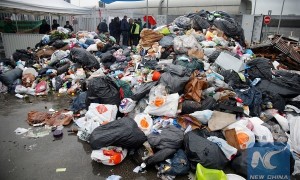1. We, President Xi Jinping of the People's Republic of China, President Mauricio Macri of the Republic of Argentina, President Alexander Lukashenko of the Republic of Belarus, President Michelle Bachelet Jeria of the Republic of Chile, President Milos Zeman of the Czech Republic, President Joko Widodo of the Republic of Indonesia, President Nursultan Nazarbayev of the Republic of Kazakhstan, President Uhuru Kenyatta of the Republic of Kenya, President Almazbek Atambayev of the Kyrgyz Republic, President Bounnhang Vorachith of the Lao People's Democratic Republic, President Rodrigo Roa Duterte of the Republic of the Philippines, President Vladimir Putin of the Russian Federation, President Doris Leuthard of the Swiss Confederation, President Recep Tayyip Erdogan of the Republic of Turkey, President Shavkat Mirziyoyev of the Republic of Uzbekistan, President Tran Dai Quang of the Socialist Republic of Vietnam, Prime Minister Hun Sen of the Kingdom of Cambodia, Prime Minister Hailemariam Dessalegn of the Federal Democratic Republic of Ethiopia, Prime Minister Josaia Voreqe Bainimarama of the Republic of Fiji, Prime Minister Alexis Tsipras of the Hellenic Republic, Prime Minister Orban Viktor of Hungary, Prime Minister Paolo Gentiloni of the Italian Republic, Prime Minister Najib Razak of Malaysia, Prime Minister Jargaltulgyn Erdenebat of Mongolia, State Counselor Aung San Suu Kyi of the Republic of the Union of Myanmar, Prime Minister Muhammad Nawaz Sharif of the Islamic Republic of Pakistan, Prime Minister Beata Szydlo of the Republic of Poland, Prime Minister and President-elect Aleksandar Vucic of the Republic of Serbia, President of the Government Mariano Rajoy Brey of the Kingdom of Spain, and Prime Minister Ranil Wickremesinghe of the Democratic Socialist Republic of Sri Lanka, attended the Leaders Roundtable of the Belt and Road Forum for International Cooperation on May 15, 2017 in Beijing. We also welcome the participation of Secretary-General Antonio Guterres of the United Nations, President Jim Yong Kim of the World Bank Group, Managing Director Christine Lagarde of the International Monetary Fund. The Leaders Roundtable was chaired by President Xi Jinping of the People's Republic of China.
General Context
2. We are mindful that the world economy is undergoing profound changes, presenting both opportunities and challenges. this is an era of opportunity, where countries continue to aspire for peace, development and cooperation. The UN 2030 Agenda for Sustainable Development with the set of Sustainable Development Goals at its core provides a new blueprint of international cooperation.
3. In this context, we welcome bilateral, triangular, regional and multilateral cooperation where countries place emphasis on eradicating poverty, creating jobs, addressing the consequences of international financial crises, promoting sustainable development, and advancing market-based industrial transformation and economic diversification. We note with appreciation that various development strategies and connectivity cooperation initiatives have been put forward, providing broad space for strengthening international cooperation.
4. We further recognize the challenges that the world economy faces. While it is currently experiencing modest recovery, downside risks remain. The growth of global trade and investment remains tempered, and the rules-based multilateral trading regime is yet to be strengthened. All countries, especially developing ones, still face common challenges of eradicating poverty, promoting inclusive and sustained economic growth, and achieving sustainable development.
5. Noting that the Silk Road Economic Belt and the 21st Century Maritime Silk Road (The Belt and Road Initiative) can create opportunities amid challenges and changes, we welcome and support the Belt and Road Initiative to enhance connectivity between Asia and Europe, which is also open to other regions such as Africa and South America. By providing important opportunities for countries to deepen cooperation, it has achieved positive outcomes and has future potential to deliver more benefits as an important international initiative.
6. We also emphasize the opportunities which can be created by communication and coordination among other global, regional and national frameworks and initiatives for promoting cooperation in connectivity and sustainable development, such as the 2030 Agenda for Sustainable Development, Addis Ababa Action Agenda, Agenda 2063 of the African Union, Ancient Civilizations Forum, APEC Connectivity Blueprint, ASEAN Community Vision 2025, Asia-Europe Meeting and its group on pathfinder of connectivity, Caravanserai Customs Initiative, China and Central and Eastern European Countries Cooperation, China-Europe Land-Sea Express Route, East-West Middle Corridor Initiative, EU-China Connectivity Platform, EU Eastern Partnership, Eurasian partnership based on the principles of equality, openness and transparency, Initiative for the Integration of Regional Infrastructure in South America, Master Plan on ASEAN Connectivity 2025, Main Directions for Economic Development of the Eurasian Economic Union until 2030, Paris Agreement on Climate Change, Trans-European Transport Networks, Western Balkans 6 Connectivity Agenda, and the WTO Trade Facilitation Agreement.
7. We reaffirm our shared commitment to build an open economy, ensure free and inclusive trade, and oppose all forms of protectionism including in the framework of the Belt and Road Initiative. We endeavor to promote a universal, rules-based, open, nondiscriminatory and equitable multilateral trading system with the WTO at its core.
Cooperation Objectives
8. We stand for enhancing international cooperation including the Belt and Road Initiative and various development strategies, by building closer collaboration partnerships, which include advancing North-South, South-South and triangular cooperation.
9. We reiterate the importance of expanding economic growth, trade and investment based on a level-playing field, market rules and universally recognized international norms. We welcome the promotion of industrial cooperation, scientific and technological innovation, and regional economic cooperation and integration so as to increase, inter alia, the integration and participation of micro, small and medium enterprises in global value chains. Attention should be paid to tax and fiscal policies, prioritizing growth and productive investment.
10. We stand for strengthening physical, institutional and people-to-people connectivity among all countries. The least developed countries, landlocked developing countries, small island developing states and middle-income countries deserve special attention to remove bottlenecks of development and achieve effective connectivity.
11. We endeavor to expand people-to-people exchanges, promote peace, justice, social cohesion, inclusiveness, democracy, good governance, the rule of law, human rights, gender equality and women empowerment; work together to fight against corruption and bribery in all their forms; to be more responsive to all the needs of those in vulnerable situations, such as children, persons with disabilities and older persons; and help improve global economic governance, and ensure equal access by all to development opportunities and benefits.
12. We are determined to protect the planet from degradation, including through taking urgent action on climate change and encouraging all parties that have ratified it to fully implement the Paris Agreement, managing the natural resources in an equitable and sustainable manner, conserving and sustainably using oceans and seas, freshwater resources, as well as forests, mountains and drylands, protecting biodiversity, ecosystems and wildlife, combating desertification and land degradation so as to achieve sustainable development in its three dimensions in a balanced and integrated manner.
13. We encourage the involvement of governments, international and regional organizations, the private sector, civil society and citizens in fostering and promoting friendship, mutual understanding and trust.
Cooperation Principles
14. We uphold the spirit of peace, cooperation, openness, transparency, inclusiveness, equality, mutual learning, mutual benefit and mutual respect by strengthening cooperation on the basis of extensive consultation and the rule of law, joint efforts, shared benefits and equal opportunities for all. In this context we highlight the following principles guiding our cooperation, in accordance with our respective national laws and policies:
a) Consultation on an equal footing: Honoring the purposes and principles of the UN Charter and international law including respecting the sovereignty and territorial integrity of countries; formulating cooperation plans and advancing cooperation projects through consultation.
b) Mutual benefit: Seeking convergence of interests and the broadest common ground for cooperation, taking into account the perspectives of different stakeholders.
c) Harmony and inclusiveness: Acknowledging the natural and cultural diversity of the world and recognizing that all cultures and civilizations can contribute to sustainable development.
d) Market-based operation: Recognizing the role of the market and that of business as key players, while ensuring that the government performs its proper role and highlighting the importance of open, transparent and nondiscriminatory procurement procedures.
e) Balance and sustainability: Emphasizing the importance of economic, social, fiscal, financial and environmental sustainability of projects, and of promoting high environmental standards, while striking a good balance among economic growth, social progress and environmental protection.
Cooperation Measures
15. We affirm the need to prioritize policy consultation, trade promotion, infrastructure connectivity, financial cooperation and people-to-people exchanges, and we highlight concrete actions, in accordance with our national laws and regulations and international obligations where applicable, such as:
a) Pursuing dialogue and consultation in order to build synergies in development strategies among participating countries, noting the efforts to strengthen cooperation in coordinating development of the Belt and Road Initiative with other plans and initiatives as mentioned in Paragraph 6 and to promote partnerships among Europe, Asia, South America, Africa and other regions.
b) Conducting in-depth consultation on macroeconomic issues by optimizing the existing multilateral and bilateral cooperation and dialogue mechanisms, so as to provide robust policy support for practical cooperation and the implementation of major projects.
c) Strengthening cooperation on innovation, by supporting innovation action plans for e-commerce, digital economy, smart cities and science and technology parks, and by encouraging greater exchanges on innovation and business startup models in the internet age in respect of intellectual property rights.
d) Promoting practical cooperation on roads, railways, ports, maritime and inland water transport, aviation, energy pipelines, electricity, fiber optic including transoceanic cable, telecommunications and information and communication technology, and welcoming the development of interconnected multimodal corridors, such us a new Eurasian Land Bridge, Northern Sea Route, the East-West Middle Corridor etc., and major trunk lines to put in place an international infrastructure network over time.
e) Maximizing synergies in infrastructure planning and development by taking into account international standards where applicable, and by aiming at harmonizing rules and technological standards when necessary; fostering a favorable environment and predictability for infrastructure investment by private capital; promoting public-private partnership in areas that create more jobs and generate greater efficiency; welcoming international financial institutions to increase support and investment for infrastructure development.
f) Deepening economic and trade cooperation; upholding the authority and effectiveness of the multilateral trading system, and working together to achieve positive outcomes at the 11th WTO ministerial conference; promoting trade and investment liberalization and facilitation; enabling the general public to benefit from trade.
g) Expanding trade by nurturing new areas of trade growth, promoting trade balance and promoting e-commerce and the digital economy, welcoming the development of free trade areas and the signing of free trade agreements by interested countries.
h) Advancing global value-chain development and supply-chain connectivity, while ensuring safer work places and strengthening social protection systems; increasing two-way investment, and enhancing cooperation in emerging industries, trade and industrial parks and cross-border economic zones.
i) Enhancing cooperation in ensuring the protection of the environment, of biodiversity and of natural resources, in addressing the adverse impacts of climate change, in promoting resilience and disaster-risk reduction and management, and in advancing renewable energy and energy efficiency.
j) Regarding the process of customs clearance, strengthening cooperation on information exchange and on developing mutual recognition of control, mutual assistance of enforcement, and mutual sharing of information; enhancing customs cooperation with a view to facilitating trade including by harmonizing procedures and reducing costs, and in this regard, strengthening cooperation in protecting intellectual property rights.
k) Jointly working on a long-term, stable and sustainable financing system; enhancing financial infrastructure connectivity, by exploring new models and platforms of investment and financing and improving financial services; assessing the opportunity to better serve local financial markets; and encouraging development-oriented financial institutions to play an active role and strengthen cooperation with multilateral development institutions.
l) Contributing to a stable and equitable international financial system; promoting openness and connectivity among financial markets, including through mutual cooperation on payment systems and the promotion of financial inclusion; encouraging financial institutions to establish commercial presence in relevant countries and regions; promoting bilateral local currency settlement and cooperation agreements, and facilitating the development of local currency bonds and stock markets; encouraging dialogue to enhance financial cooperation and fend off financial risks.
m) Promoting people-to-people exchanges and bonds by deepening practical cooperation on education, science, technology, sport, health, think tanks, media, and capacity-building, including through internships.
n) Encouraging dialogue among civilizations, cultural exchanges, promoting tourism and protecting the world's cultural and natural heritage.
Our Vision for the Future
16. Our joint endeavor on the Belt and Road Initiative and seeking complementarities with other connectivity initiatives provide new opportunities and impetus for international cooperation. It helps to work for a globalization that is open, inclusive and beneficial to all.
17. We reiterate that promoting peace, mutually-beneficial cooperation, and honoring the purposes and principles of the UN Charter and international law are our shared responsibilities; achieving inclusive and sustainable growth and development, and improving people's quality of life are our common goals; creating a prosperous and peaceful community with shared future for mankind is our common aspiration.
18. We congratulate China on successfully hosting the Belt and Road Forum for International Cooperation.







